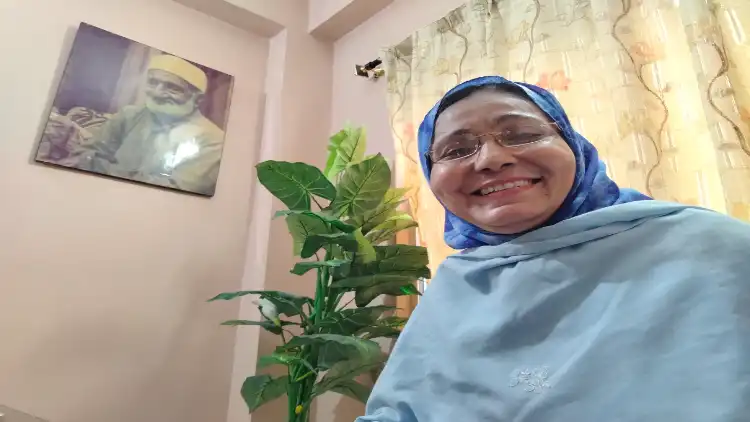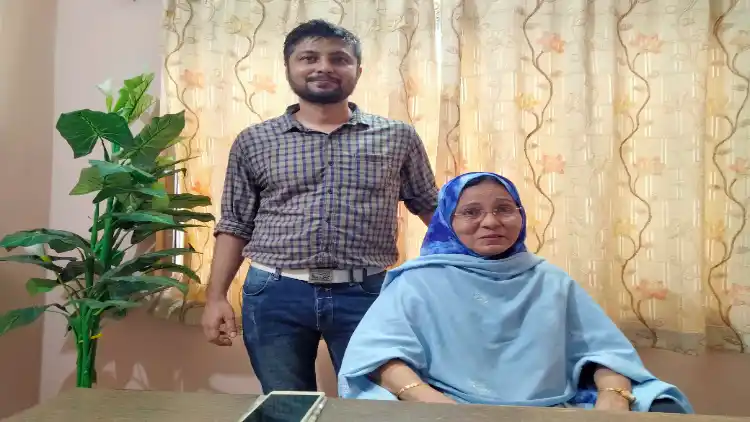
Mohammed Safi Shamsi/Kolkata
Yasmin Nigar Khan, 50, otherwise a common resident in the Karim Hussain Lane, is drawing attention that even a celebrity would feel envious of. Living in a narrow bye lane close to the city’s famous Park Circus 7-point Crossing Yasmin is the cynosure of the media.
This is related to the dramatic changes in Afghanistan where the Taliban have taken control after 20 years.
“Subah 10 baje se raat 11 tak, I am talking to press. Channel main baitha dete hain, studio main takleefde hota hai (I am talking to the press all day. It’s painful to attend chat shows in studios),” Yasmin, who looks tired and yet manages to smile tells Awaz-the Voice.
Yasmin heads All India Pakhtoon Jirga-e-Hind, a body that works for the welfare of Pakhtoons living in India, and was set up by her father Khan Lala Jan Khan in 1949.
Khan was adopted as his grandson by Khan Abdul Ghaffar Khan, also known as Badshah Khan and Frontier Gandhi.
Like the people in the rest of the world, Afghanistan’s changing situation has left many Indians worried about its repercussions on the region.
Pakhtoons, who live as a distinct ethnic group in Pakistan and Afghanistan, have also their presence in India. The community has had its presence in Kolkata for several decades. the Pakhtoon neighbourhoods of the city are referred to as Khan kothis. There could be 80 or more such kothis in Kolkata, says Yasmin.

Yasmin Nigar Khan and Arshad Ahmed Danish Khan
“Pakhtoons were never in favour of being a part of Pakistan. Asylum was given to those who wanted to stay in India. Kids born in successive generations are Indians. We continue to work for the welfare of our community in India. My father was chosen by Badshah Khan as a successor to carry forward efforts for our community,” says Yasmin.
The Afghanistan of today is chaotic, as much as it has been a sensitive and strategic terrain under different regimes. “I visited Afghanistan with my father, once, in 1986. There, I met my father’s relatives. Our families have been liberal. I recall having observed the children of my father’s cousin. They were, then, studying in Russia or in other European countries. Those were different days,” Yasmin said.
The Pakhtoons have been in India for around 100 years now, on ground, as much as they have been a part of folklore and films. A question that puzzles the commoners is why Afghanistan has failed to change, despite military and humanitarian efforts. “Education ki wahan kami hai. Agar education hoti to log mislead nahin hote (Education has remained scarce, there. Had there been adequate resources, things wouldn’t have turned out this way),” says Yasmin.
While the Afghan trouble bothers her, Yasmin and her community members feel that the governments (the Centre and the state), here in India, should do something for the thousands of Pakhtoons for whom India is their home.
A university in the name of Khan Abdul Ghaffar Khan, perhaps, that offers opportunities to Afghan children, besides opening its doors for the rest of the communities in India, could be a project to consider.
“My father’s estimates (then) suggested that over 32 lakh pakhtoons were living in India. Many of the descendants are Indian by birth. My father’s origins were Afghani. But, my mother is an Indian, so am I,” adds Yasmin.
Members in the community, living in Kolkata, lend out money. They trade in cloth. There used to be a time when trading dry fruits was also a good business. Now, besides observing festivals like Eid, it’s only get-togethers over weddings, when the cultural aspect is more evident. The khan-kothis are places to gather.
Yasmin continues to attend phone calls, as I sit with her through our interview. Besides the Frontier Gandhi’s portrait on the wall in her ground-floor office, where she interacts with representatives of the national and regional press, there’s isn’t much that makes this place different. It’s just another house in the vicinity of other residential buildings, with a mosque next door.
While Yasmin sat through an interaction with a YouTuber, I was able to chat with Arshad Ahmed Danish Khan, her younger brother, one of the six siblings. Arshad is the secretary of the organisation.
“A country in a state of war for 40-50 years is abnormal. You can’t have peace at gunpoint. I am born an Indian. But what’s happening out there is a concern. A few years ago, youngsters were talking about careers. Now they want to fly out of Afghanistan,” Danish says.
The Afghan problem, this time, is more amplified. “Previously, when Pakhtoons faced atrocities, the world never used to know. Social media is amplifying the issue this time,” he adds.
As a secretary of the organisation, Danish takes up issues that bother his community in India. The priority in Afghanistan should be on governance rather than on expanding control over the provinces, he feels. Second, women empowerment is essential for the war-ridden country’s development, he says.
Like him, most Pakhtoons of his generation are more at home in Kolkata, in terms of the city's culture that has absorbed everyone into its fold over the decades. “I never had difficulty. I prefer fish over meat. I am more Bengali than many others. The Coffee House on College Street is my favourite place,” he smiles.
A few community members are gathering at Yasmin’s office to observe Afghan Independence Day (19 August). This is a symbolic gesture of solidarity with Pakhtoons. “So far, we have contributed among ourselves to run our organisation. Now we may need funds if we have to undertake projects in Badshah Khan’s memory,” says Yasmin.
What about Taliban? Will they be acceptable? Yasmin isn’t sure.
